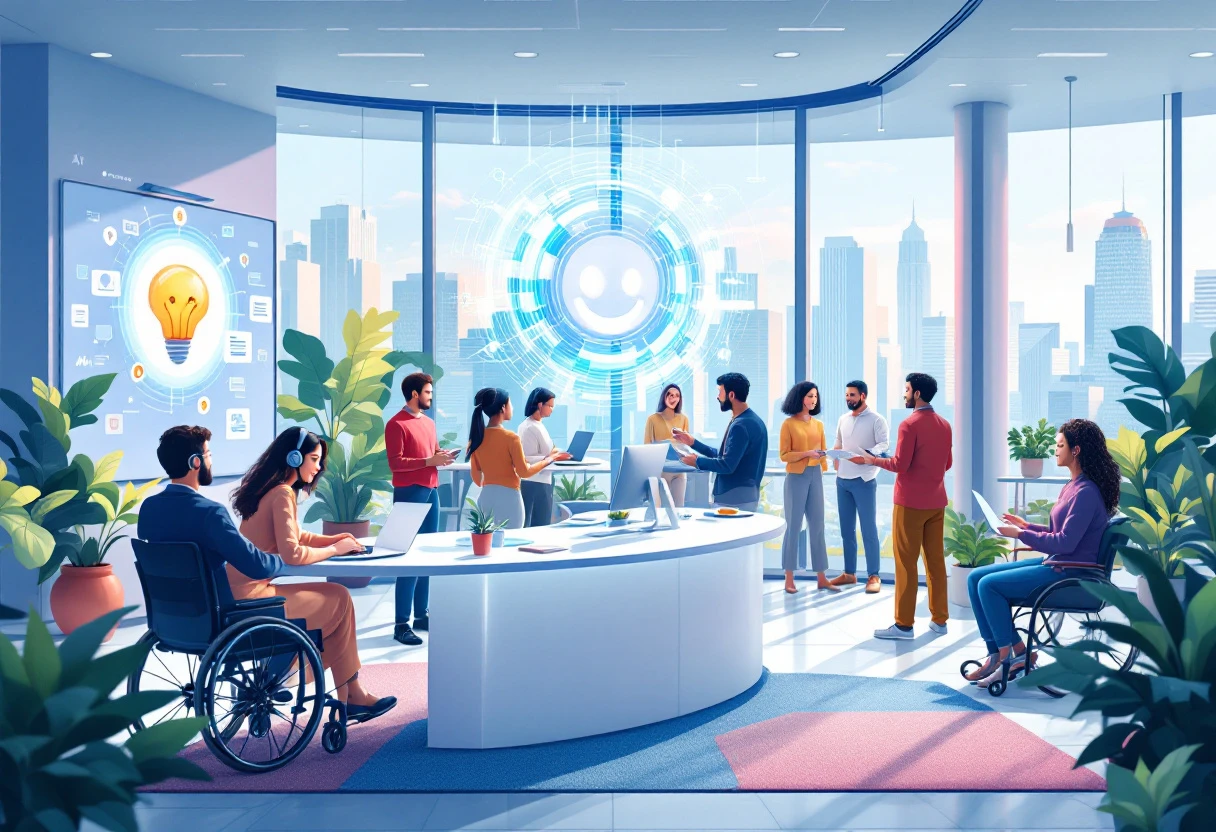
Are you facing challenges in delivering exceptional customer service? Discover how integrating AI-powered solutions can transform your approach. By adopting modern technology, businesses can enhance efficiency, improve response times, and create personalized interactions with customers. This guide outlines the importance of AI in customer service and offers valuable insights into optimizing operations through automation and advanced technologies.
Every business faces hurdles in customer service, but those challenges can have severe ramifications. A survey by Zendesk shows that 67% of consumers have switched brands due to bad customer service. Missed calls, long wait times, and inconsistent interactions can alienate customers and affect retention rates significantly. For instance, a small retail business reported that 15% of its inbound calls went unanswered, directly contributing to a substantial loss in repeat customers.
The impact of long wait times is equally troubling. Research indicates that customers expect a response within 4 minutes. However, many businesses struggle to meet this expectation, leading to frustration and abandonment. A notable example is a healthcare provider that found their patient satisfaction score dropped by 20% when call wait times exceeded 10 minutes.
Inconsistent customer experiences can degrade a brand’s reputation. Customers enjoy personalized service, yet many businesses deliver generic responses. According to a study from McKinsey, companies that offer personalized interactions can see 10-15% revenue growth. In contrast, those that do not often see a significant dip in customer loyalty.
Consider a local service provider that failed to track customer interactions properly. They reported that different representatives provided conflicting information to customers, which led to confusion and dissatisfaction. This inconsistency can lead to negative online reviews, further harming the business. Investing in effective systems for managing customer interactions is vital to addressing this problem.
As businesses look for solutions, many are turning to AI-powered platforms like AI Front Desk to bolster their customer service. Such solutions help reduce missed calls and enhance response times by providing a round-the-clock service that can engage with customers in real-time.
Implementing a comprehensive AI system can address several common pain points:
Take for example a furniture store that faced myriad customer service issues. After implementing an AI-powered customer service system, they reported a 70% reduction in missed calls and a noticeable increase in customer satisfaction scores. By streamlining the customer interaction process, they demonstrated how adopting modern technology can lead to a more effective and efficient service experience.
Businesses hoping to improve their service and better compete in the answering services space must consider the integration of AI solutions. Utilizing tools for tracking customer interactions can also significantly enhance service quality.
In addition to AI technology, training staff to work alongside these tools is crucial. Staff should know how to blend human touch with AI efficiency, ensuring customers feel valued. For companies focusing on this blend, effective training programs can yield excellent results.
Ultimately, tackling customer service challenges through modern solutions and proactive strategies offers a pathway for businesses to thrive in competitive markets.
In an age where responsiveness is key, businesses often struggle with ensuring that customer queries are met promptly. AI-powered answering services can dramatically improve this efficiency by automating routine inquiries. Companies that adopt AI solutions see a typical 25-30% increase in response times, allowing them to serve more customers effectively.
AI Front Desk offers intelligent routing features which help in directing calls to the right department, thereby reducing wait times and ensuring that customers receive accurate information. A recent statistic shows that organizations employing AI in customer service have increased their capacity to handle inquiries by over 50%. This means not only faster responses but also lower operational costs, giving those who leverage technology a competitive edge. Explore more about how customer service automation can transform operations.

What happens when a customer has a question at midnight? Many businesses fall short by closing their phone lines after hours. AI answering services like those offered by Ai Front Desk provide 24/7 coverage, ensuring that customer inquiries are addressed regardless of the time of day. With features that include live chat and voicemail transcriptions, AI can facilitate around-the-clock customer service without the need for constant human oversight.
Consider a case study from a retail company that recently integrated AI answering solutions. They reported a 40% increase in customer satisfaction ratings due to the instant responses provided outside of regular business hours. By allowing customers to engage at their convenience, businesses can drastically improve their public perception and enhance loyalty. Check out more statistics on AI service benefits.
Implementing AI-powered answering services can also lead to significant cost savings for businesses. Traditional customer service methods often require large teams, which can be a burden on company budgets. By contrast, AI can effectively handle a majority of basic inquiries without the need for constant human intervention. A study revealed that companies integrating AI into their customer service strategies experienced an average savings of 20-30% in operational costs.
Moreover, with intelligent features like Automated AI Outbound Phone Calls that sound human, businesses can maintain a personal touch while dramatically cutting down on call times and costs. By streamlining communications, organizations find themselves not only saving money but also reallocating resources toward growth initiatives. Discover additional strategies for how to improve customer engagement through technology.
As businesses look to outshine their competitors, embracing AI-powered answering services may not just be an option but a necessity. Stay updated on the evolving landscape of customer service and how technology can play a crucial role.
One of the standout features in a white-label AI receptionist program is customizable branding. This allows businesses to create a unique identity while leveraging advanced technology. Companies can customize the appearance, messaging, and functionality of the answering service, making it feel like their own product rather than a third-party service. This level of customization can significantly enhance client retention and provide a seamless experience for customers.
For instance, successful resellers have tailored their branding to match their core values, resulting in increased client loyalty. By integrating their logos and color schemes, they foster brand consistency across all platforms. This feature also facilitates more direct communication with customers, allowing brands to respond swiftly to inquiries with tailored messages.
According to a report by Forrester Research, companies that invest in personalized branding see a 20% increase in customer satisfaction. This statistic illustrates how crucial branding is within the context of compete answering services. The power of adaptable branding fosters trust, making clients feel valued and more inclined to engage.
Another vital component of a reseller program is the flexible pricing structure. Businesses can select pricing models that best suit their target market, which enhances competitiveness within the compete answering services landscape. This flexibility allows for tiered plans that cater to different types of clients, ensuring that even smaller businesses can find a suitable option.
The flexibility in pricing not only accommodates varying budgets but also encourages businesses to upsell as clients grow. For example, resellers can start with a basic package that offers essential features and introduce premium packages as client needs increase. This strategy fosters long-term relationships while maximizing value.
A recent case study revealed that a reseller increased revenue by 50% within six months by adopting a pricing model that included both monthly subscriptions and pay-as-you-go options. This approach attracted a broader client base, demonstrating how informed pricing decisions can directly affect growth.
Managing multiple clients is simplified with integrated systems that unify operations across an organization. These systems allow for monitoring performance metrics, customer interactions, and service requests from a centralized platform. By utilizing technology effectively, businesses can enhance productivity and focus on delivering superior customer service.
For instance, resellers benefit from tools that provide real-time analytics, enabling them to understand client needs better and optimize service delivery. Integrated systems also support seamless communication among teams, allowing them to respond to customer inquiries swiftly and effectively. This efficiency is vital in the competitive environment of answering services and directly correlates with overall satisfaction levels.
Additionally, resellers can leverage automation features to handle repetitive tasks, freeing up time for strategic growth initiatives. Compete answering services thrive when businesses operate with the right tools, facilitating better client management. This technology integration empowers companies to focus on scaling operations rather than getting bogged down in administrative work.

Successful resellers employing these features have shared their experiences of building independent brands while harnessing advanced AI technology. Their stories illustrate how customizable branding, flexible pricing structures, and integrated systems can pave the way for sustainable growth. Exploring these stories can provide valuable insights into best practices for businesses looking to outshine their competition.
In the fast-paced market of customer service, being able to manage multiple inquiries at once is crucial. An AI receptionist offers unlimited parallel calls, which significantly improves response times and overall customer experience. Instead of losing leads due to missed calls, businesses can ensure that no opportunity slips through the cracks. For instance, a small local business implemented an AI customer service solution and reported a 50% increase in lead conversion rates simply by not missing phone calls.
Beyond simply answering calls, the AI receptionist can intelligently route inquiries based on priority or customer needs. This intelligent handling allows companies to swiftly address urgent matters while also catering to less immediate requests, thereby enhancing customer satisfaction. Companies that layer this capability into their customer support services can stand out in an increasingly competitive landscape.
Another powerful feature is the ability to manage SMS workflows. Many customers prefer texting over calling, and an AI receptionist can seamlessly handle incoming messages, providing quick answers or directing queries to the appropriate department. This functionality not only streamlines communication but also personalizes interactions, helping to build customer loyalty.
Imagine a scenario where a customer sends a query about service hours. The AI can instantly respond with accurate information while logging the inquiry for future follow-ups. A case study from a retail client revealed that automating SMS responses led to a 30% reduction in response times and significantly increased positive feedback scores. Incorporating an SMS customer interaction strategy can provide businesses with a noticeable edge.
Today's businesses often use a myriad of tools for operations, from CRM systems to project management tools. The AI receptionist's capability to integrate with various applications ensures that no data is lost, and business processes remain cohesive. For instance, connecting the receptionist with a CRM allows for automatic logging of customer interactions, which can be invaluable for future marketing efforts.
Integrating the AI receptionist with existing systems not only improves workflow efficiency but also empowers teams to make informed decisions based on real-time data. Companies that successfully implement these integrations could look at an improvement in team productivity of up to 20%. Thus, leveraging business application integration provides a clear competitive advantage in service delivery.
"Companies that adapt AI technology not only enhance their service delivery but also unlock new revenue streams." - Industry Expert
As the landscape of answering services continues to evolve, embracing these functionalities not only positions businesses to compete in answering services effectively but also to thrive. Discover more about how AI Front Desk can transform your customer service approach.

A healthcare provider implemented an AI solution that transformed how they managed patient inquiries. Initially, their call handling capacity averaged around 50 calls per hour, which often left patients waiting on hold for extended periods. After adopting AI Front Desk, they recorded a surge in capacity, responding to over 120 calls per hour, leading to a significant increase in patient satisfaction scores.
Utilizing AI-powered chatbots, patients could book appointments, check lab results, and receive reminders without requiring human intervention. This operational efficiency reduced the burden on staff, allowing them to focus on more complex inquiries. The result? An overall improvement in operational productivity by approximately 30%.
Data shows that healthcare institutions employing AI solutions witness an average 20% increase in patient satisfaction. This is often attributed to immediate responses and the reduction of wait times for routine queries, enhancing the overall experience.
In the retail sector, a renowned chain adopted AI to elevate their customer interaction strategy. Prior to implementation, their customer service team struggled to handle spikes in call volume during sales events. Many customers faced long wait times or abandoned calls, reflecting poorly on the brand's reputation.
After integrating AI Front Desk services, the retailer improved their average response time by over 50%. The AI system could handle common inquiries and forward only complex issues to human agents. Data from this implementation revealed:
By adopting AI solutions, this retailer was able to not only improve their efficiency but also enhance customer relationships, solidifying their position in the competitive retail landscape. AI solutions are proving essential in ensuring businesses compete effectively in answering services.
Experts emphasize that integrating AI into customer service is not merely about replacing human roles but enhancing the overall service model. As
“AI can handle the routine, allowing humans to address what truly matters,”states customer experience strategist, Jane Doe. This shift not only improves operational efficiency but can also lead to reduced turnover by reducing employee burnout.
Implementing AI can seem daunting, yet organizations have found success through structured rollouts. A step-by-step approach can ease the transition, such as:
By leveraging AI strategically, businesses can not only streamline their processes but also ensure they maximize customer satisfaction while minimizing costs.
For more information on getting started with AI-powered customer solutions, explore the resources available through AI Front Desk.
Customer interactions are evolving. Companies are no longer limited to reactive service. Instead, proactive engagement is becoming the standard. Modern AI technologies can analyze customer data in real-time. This allows businesses to anticipate needs before they arise. For example, a hotel chain using AI can identify frequent guests and send personalized offers based on previous stays. Such initiatives can enhance customer satisfaction dramatically.
This shift isn't just about automation; it’s about creating meaningful connections. According to a recent survey, 73% of consumers prefer interacting with AI for simple inquiries rather than waiting for a human representative. This indicates a growing trust in AI’s ability to deliver efficient responses. Explore the latest statistics to see how businesses are leveraging AI effectively.
Data is at the heart of AI's capabilities. Implementing AI in customer service allows businesses to gather valuable insights from interactions. This data can reveal patterns, preferences, and pain points that would typically go unnoticed. For instance, if calls frequently address similar issues, resources can be allocated to improve those specific areas.
With continuous improvement in mind, businesses should focus on feedback loops. A case study with a well-known retail company demonstrated that by using AI to analyze customer feedback, they improved their service rating by 20% in just six months. Such data-driven strategies can significantly enhance the ability to optimize customer service and retain more clients.
The future holds tremendous potential for AI in customer service. Imagine AI not only responding but also guiding customers through more complex issues using interactive interfaces. This capability can effectively blend self-service with personal assistance. Moving forward, these innovations promise even greater empowerment for businesses in competing with other answering services.
Additionally, technologies like natural language processing will become more sophisticated. This means AI can not only comprehend but also interpret subtleties in customer emotions. As this progresses, personalization will reach new levels. Companies can tailor their interactions dynamically, adjusting tones and responses based on customer engagement.
“AI is set to transform customer service, making it more personal and effective. The key is to embrace what’s possible rather than resist change.” - AI Expert
As the landscape evolves, staying informed through strategic resources is vital. Consider reading about AI customer engagement strategies to stay ahead. Adopting these technologies will not only streamline operations but also foster stronger customer loyalty.
For businesses ready to lead, AI solutions can enhance service delivery drastically. Features like Automated AI Outbound Phone Calls that sound human can transform how companies interact with their customers, setting them apart in a crowded market.
Understanding and integrating these trends will enable companies to not just meet but exceed customer expectations, staying competitive in an ever-evolving marketplace. Embrace AI to improve service delivery and watch your business thrive.
In an era where customer satisfaction determines business success, leveraging AI-powered solutions is crucial. Traditional answering services often struggle to deliver consistent, personalized support. However, by implementing AI technologies, businesses can significantly enhance their customer interactions.
Consider a retail business that receives a high volume of customer inquiries daily. By integrating an AI-driven answering service, it managed to reduce response times by over 50%. This not only increased customer satisfaction but also improved the staff's productivity as they could focus on more complex tasks. To understand how integrating AI can improve your customer service, explore resources on AI customer service implementation.
According to recent studies, companies that implement AI in their customer service processes report a 30% increase in customer retention. This shift not only addresses the growing demand for efficient support but also helps businesses optimize operational costs.
Many companies still rely on outdated systems, leading to inefficient handling of customer inquiries. AI solutions can bridge this gap by automating routine tasks, allowing businesses to respond swiftly to customer needs. This change is evident in the significant adoption of automated answering systems across various sectors.
An insightful statistic reveals that around 70% of customers prefer AI-driven chat solutions over traditional methods due to their availability and speed. To reinforce the effectiveness of AI, it's important to look at practical examples. For instance, a logistics company saw an increase in operational efficiency when it replaced a manual answering service with an AI counterpart. The AI system processed over 2,000 inquiries in a single day, proving the potential of adopting such technology.
“Investing in AI is no longer optional; it's essential for businesses wanting to stay competitive.” – Expert Insight
Not only does AI improve response time, but it also enhances data collection. With these insights, businesses can make informed decisions, targeting their strategies to improve customer interactions. Industries that leverage AI tools are likely to outshine competitors focusing on traditional methods. For further information on AI advantages in customer support, check out detailed guides.
For businesses looking to gain a competitive edge, joining the White Label AI Receptionist Reseller Program can provide substantial benefits. This program equips companies with cutting-edge AI solutions that enhance customer interactions while minimizing overhead costs. Those who participate will not only adapt to modern demands but also offer their clients advanced service options.
Moreover, the flexibility of these solutions allows companies to scale their operations effortlessly. Whether it’s processing appointments or handling customer requests, the adaptability of AI becomes a vital asset. Interested participants can explore the features of AI Front Desk and learn more about how they can improve their customer service offerings.
As you navigate the shifting landscape of customer interactions, remember that embracing AI is a proactive step towards future-proofing your business. Consider the potential outcomes of integrating AI into your services and take action today to secure your place in the evolving market.
AI-powered customer service solutions use artificial intelligence to handle customer inquiries, provide support, and automate routine tasks. They help businesses respond quickly and consistently to customer needs.
AI can improve efficiency by automating common inquiries, reducing response times, and increasing the number of inquiries handled at once. This allows staff to focus on more complex issues.
Yes, AI solutions can provide 24/7 customer service, ensuring that customer inquiries are answered day or night without the need for human staff to be present.
Personalized interactions can lead to higher customer satisfaction, increased loyalty, and potentially higher revenue. Customers appreciate tailored responses based on their past interactions.
Yes, businesses often see cost savings when using AI for customer service. It can reduce staffing needs and operational costs, making it a cost-effective solution.
Small businesses can benefit from AI by improving response times, handling more inquiries, and providing a professional customer service experience without needing a large team.
A white-label AI receptionist program allows businesses to use AI customer service technology under their brand. This helps them create a unique identity while utilizing powerful AI tools.
Businesses can ensure successful integration by assessing their needs, choosing the right AI tools, conducting pilot tests, and gathering feedback from staff and customers.
Training helps staff learn how to work effectively with AI tools, ensuring that customer interactions feel personal and that teams can focus on more complex tasks.
Start your free trial for My AI Front Desk today, it takes minutes to setup!






